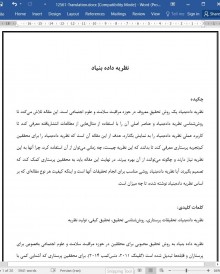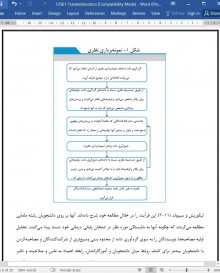
دانلود مقاله نظریه داده بنیاد
چکیده
نظریه دادهبنیاد یک روش تحقیقِ معروف در حوزه مراقبت سلامت و علوم اجتماعی است. این مقاله تلاش میکند تا روششناسی نظریه دادهبنیاد و عناصر اصلی آن را با استفاده از مثالهایی از مطالعات انتشاریافته معرفی کند تا کاربرد عملی نظریه دادهبنیاد را به نمایش بگذارد. هدف از این مقاله آن است که نظریه دادهبنیاد را برای محققین کمتجربه پرستاری معرفی کند تا بدانند که این نظریه چیست، چه زمانی میتوان از آن استفاده کرد، چرا آنها به این نظریه نیاز دارند و چگونه میتوانند از آن بهره ببرند. در نهایت این مقاله باید به محققین پرستاری کمک کند که تصمیم بگیرند آیا نظریه دادهبنیاد روشی مناسب برای انجام تحقیقات آنها است و اینکه کیفیت هر نوع مقالهای که بر اساس نظریه دادهبنیاد نوشته شده، تا چه میزان است.
نظریه داده بنیاد به روش تحقیق محبوبی برای محققین در حوزه مراقبت سلامت و علوم اجتماعی بخصوص برای پرستاران و قابلهها تبدیل شده است (گلینگ 2011، دنسکمب 2014). برای محققین پرستاری که آشنایی کمی با روششناسی تحقیق کیفی دارند، نظریه دادهبنیاد یکی از روشهایی است که میتوانند مدنظر قرار دهند.
دشوار است که تعریف قطعی از نظریه دادهبنیاد ارائه داد. چند روش برای تعریفکردن این نظریه تا کنون امتحان شده است (گلیزر و اشتراوس 1967، اشتراوس و کوربین 1990، لارک 2005، چارماز 2006). تعاریف متعدد حاکی از آن است که چطور روششناسی این نظریه در طول زمان تغییر کرده است (ماز 2013). با این حال، 3 اصل اساسی وجود دارد که نظریه دادهبنیاد را از دیگر روشهای تحقیق متمایز میکند (دنسکمب 2014). این 3 صال عبارتند از 1) تولید نظریه، ظهور یک نظریه در تحقیقات تجربی با تاکید بر کار میدانی یا تحقیقاتِ عملی واقعی؛ 2) جمعآوری نظاممند و تحلیلکردن دادهها با استفاده از نمونهگیری نظری و3) تحلیل قیاسی مداوم (کادر یک).
نتیجهگیری
هدف از این مقاله، معرفیکردن نظریه دادهبنیاد از طریق کشفکردن قواعد اساسی این روش بود. نظریه دادهبنیاد یک چارچوب توضیحی فراهم میکند که مبتنی بر نظریهای است که از خلالِ صحبتهای شرکتکنندگان بیرون میآید. نظریه داده بنیاد یک روش نظاممند برای نسبت دادن توضیحات به رفتارها و خلاقانه است. این نظریه به پژوهشگر امکان میهد تا نسبت به آنچه مصاحبهشوندگان میگویند، موضع بازی داشته باشد. فرآیند نظاممند جمعآوری و تحلیل داده باز و شفاف است و منجر به توسعه فهمی از مهمترین حوزههای موردعلاقه میشود. نظریه دادهبنیاد، پژوهشگر پرستاری را به فراسوی توصیفات برده تا به یک نظریه قائم به ذات مرتبط دست پیدا کند. ممکن است این نظریه در دیگر زمینهها نیز قابل کاربست باشد.
Abstract
Grounded theory is a popular research approach in health care and the social sciences. This article provides a description of grounded theory methodology and its key components, using examples from published studies to demonstrate practical application. It aims to demystify grounded theory for novice nurse researchers, by explaining what it is, when to use it, why they would want to use it and how to use it. It should enable nurse researchers to decide if grounded theory is an appropriate approach for their research, and to determine the quality of any grounded theory research they read.
GROUNDED THEORY HAS become a popular research approach for researchers in health care and the social sciences, particularly nurses and midwives (Gelling 2011, Denscombe 2014). For the nurse researcher new to qualitative research methodology, grounded theory is one of a number of approaches to consider.
It is difficult to provide a definitive description of grounded theory. There are several approaches to it (Glaser and Strauss 1967, Strauss and Corbin 1990, Clarke 2005, Charmaz 2006), which reflect how the methodology has diversified over time (Maz 2013). However, there are three basic tenets that differentiate grounded theory from other research approaches (Denscombe 2014): theory generation; an emergent theory grounded in empirical research with an emphasis on fieldwork or practical real world research; and concurrent systematic collection and analysis of data using theoretical sampling and constant comparative analysis (Box 1).
Conclusion
This article aims to demystify grounded theory methodology by exploring the fundamental principles of this approach. Grounded theory provides an explanatory framework that grounds, or explains, the theory that emerges in the ‘voice’ of participants. It provides a systematic way of deriving explanations for behaviour, is creative and allows the researcher to be open to what participants reveal. The systematic process of concurrent data collection and analysis is open and transparent, and leads to the development of a theoretical understanding of important areas of interest. Grounded theory enables the nurse researcher to go beyond description to create practically relevant substantive theory, which may also be relevant in other contexts.
چکیده
تولید نظریه
نظریهای بر پایه تحقیق تجربی
جمعآوری نظاممند دادهها و تحلیلکردن آنها
ماهیت پویای نظریه داده بنیاد
بهرهگیری از نظریه دادهبنیاد
مروری بر ادبیات موضوع
تائیدیه اخلاقی برای مطالعات مبتنی بر نظریه داده
روشهای گردآوری داده
نمونهگیری
تحلیل، کدگذاری و ارائه نظریه
انواع نظریه در نظریه دادهبنیاد
نتیجهگیری
منابع
Abstract
Theory generation
Theory grounded in empirical research
Systematic data collection and analysis
Dynamic nature of grounded theory
Using grounded theory
Reviewing the literature
Ethical approval of grounded theory studies
Methods of data collection
Sampling
Analysis, coding and theory presentation
Theory types in grounded theory
Conclusion
References
- اصل مقاله انگلیسی با فرمت ورد (word) با قابلیت ویرایش
- ترجمه فارسی مقاله با فرمت ورد (word) با قابلیت ویرایش، بدون آرم سایت ای ترجمه
- ترجمه فارسی مقاله با فرمت pdf، بدون آرم سایت ای ترجمه



